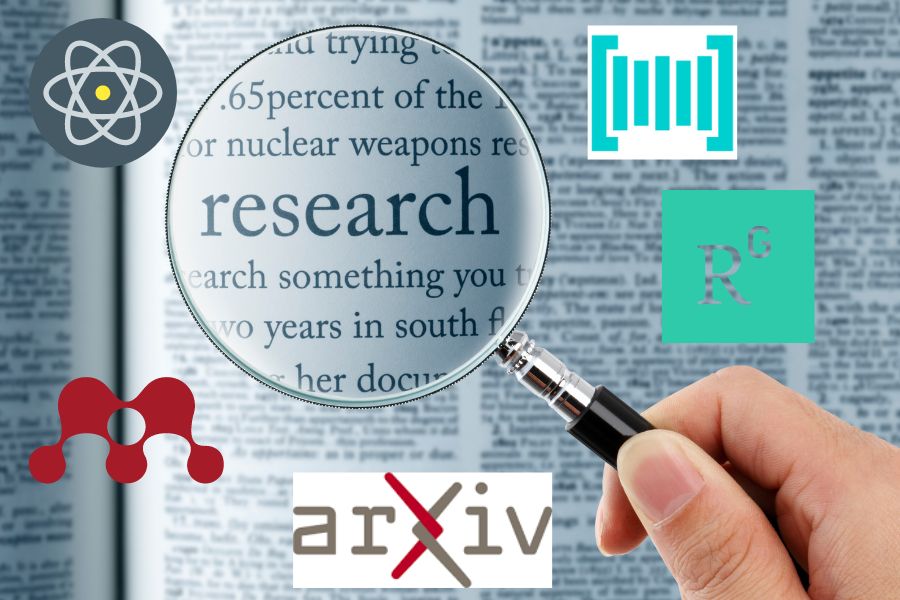Artificial Intelligence Increasingly Used Among Research Websites and Plattforms
In recent years, Artificial Intelligence (AI) has become an increasingly important tool in the world of research. As the volume of data grows and the need for more efficient and accurate analysis methods increases, AI has emerged as a game-changer across a wide range of fields. From natural sciences and social sciences to humanities and engineering, AI-driven research techniques have become essential for researchers seeking to gain insights and make breakthroughs.
In this blog post, we will introduce seven leading platforms and communities that leverage AI to support researchers across a wide range of fields. These platforms and communities offer AI-driven tools and resources that can help researchers streamline their work, enhance collaboration, and ultimately, drive innovation. By exploring these resources, researchers can harness the power of AI to advance their research and contribute to the global body of knowledge.
✅Sign up to be notified when a new blogpost is published featuring AI Tools here
Table of Contents
Google Scholar Uses AI for Research
https://vimeo.com/322837431
Overview and main features of Google Scholar
Google Scholar is a widely-used search engine designed specifically for academic literature. It provides an extensive index of scholarly articles, conference papers, theses, books, and other research materials from a diverse range of sources, including academic publishers, universities, and preprint repositories. With its user-friendly interface and advanced search options, Google Scholar enables researchers to quickly find and access relevant publications for their field of study.
Benefits and Drawbacks for researchers
Google Scholar offers several benefits to researchers, including:
- Efficient search: With its AI-powered search engine, Google Scholar enables researchers to quickly find relevant articles and publications, saving them valuable time and effort.
- Comprehensive index: By aggregating a vast array of sources, Google Scholar ensures that researchers have access to a wide range of materials, increasing the likelihood of finding pertinent information.
- Citation tracking: Google Scholar makes it easy to track citations of a particular paper or author, helping researchers gauge the impact of their work and identify influential publications within their field.
- Personalized recommendations: AI-driven recommendations enable researchers to discover new articles and stay updated on the latest developments in their area of study.
- Easy integration: Google Scholar can be easily integrated with citation management tools and other research software, streamlining the research process and facilitating collaboration.
 While Google Scholar offers numerous benefits to researchers, there are also some drawbacks to consider:
While Google Scholar offers numerous benefits to researchers, there are also some drawbacks to consider:
- Incomplete coverage: Although Google Scholar provides an extensive index, it may not cover all scholarly publications or have the most up-to-date versions of certain articles. This can lead to gaps in the available literature, which may require researchers to consult additional databases or resources.
- Limited advanced search features: Compared to specialized databases, Google Scholar’s advanced search options can be limited in terms of granularity and filtering. This may make it more difficult for researchers to find specific types of publications, such as articles with particular methodologies or those published within a certain time frame.
- Lack of full-text access: Google Scholar often provides links to abstracts or previews of articles rather than the full text. Depending on the availability and accessibility of the source material, researchers may need to locate the full text through their institution’s library or by purchasing individual articles.
ArXiv Uses AI for Research
Overview and main features
ArXiv is a widely-used, open-access repository for preprint research papers in various disciplines, including physics, mathematics, computer science, quantitative biology, and more. Launched in 1991, ArXiv has become a cornerstone of the scientific community, providing researchers with a platform to share their work before it is formally published. ArXiv offers free access to its extensive collection of preprints, enabling researchers to stay up-to-date with the latest developments in their field and receive feedback on their work.
Benefits and drawbacks for researchers
Benefits:
- Early access to research: ArXiv allows researchers to access and share their work before it is formally published, enabling them to stay updated on the latest findings and receive feedback from their peers.
- Open access: As an open-access repository, ArXiv offers free access to its vast collection of preprints, removing financial barriers to accessing cutting-edge research.
- Cross-disciplinary collaboration: ArXiv’s multidisciplinary focus encourages collaboration between researchers from different fields, fostering innovation and the exchange of ideas.
- AI-driven tools: The integration of AI technologies, such as natural language processing and semantic search, helps researchers quickly find relevant papers and gain insights into their content.
- Lack of peer review: As a preprint repository, ArXiv does not require papers to undergo peer review before being uploaded. While this enables faster dissemination of research, it also means that the quality of the content can vary, and some papers may contain errors or unsubstantiated claims.
- Limited scope: ArXiv primarily focuses on certain scientific disciplines, such as physics, mathematics, and computer science. Researchers in other fields may find fewer relevant resources and may need to consult additional repositories or databases.
- Potential for information overload: With the rapid pace of research uploads to ArXiv, it can be challenging for researchers to keep up with the latest findings and filter through the vast amount of information available.
By being aware of these benefits and drawbacks, researchers can make informed decisions about how to use ArXiv as a resource for their work, leveraging the platform’s strengths while compensating for its limitations with other complementary resources.
ResearchGate Uses AI for Research
Overview and main features
ResearchGate is a professional network for scientists and researchers, boasting over 17 million members from various disciplines. Launched in 2008, ResearchGate aims to facilitate collaboration and knowledge-sharing among its members by offering a platform to connect, ask questions, and share research findings. Researchers can create profiles, upload their publications, join specialized groups, and participate in discussions related to their field of study. Additionally, ResearchGate provides access to a vast array of research papers, conference presentations, and other resources.
Benefits and drawbacks for researchers
Benefits:
- Networking and collaboration: ResearchGate’s primary focus is on fostering connections between researchers, making it easier for scientists to collaborate, exchange ideas, and receive feedback on their work.
- Access to research materials: ResearchGate provides access to a wide range of research content, including articles, conference presentations, and datasets, enabling researchers to stay informed about the latest developments in their field.
- Personalized recommendations: The platform’s AI-driven recommendation system helps researchers discover new content, connections, and potential collaborators tailored to their interests and expertise.
- Enhanced search functionality: ResearchGate’s AI-powered search tools enable users to quickly find relevant content and researchers within the platform.
- Incomplete coverage: While ResearchGate hosts a significant amount of research content, it may not cover all publications or fields, requiring researchers to consult additional resources for a comprehensive view of the literature.
- Quality control issues: ResearchGate allows users to upload their publications without a stringent quality control process, potentially resulting in the dissemination of low-quality or plagiarized content.
- Privacy concerns: As with any online networking platform, privacy concerns may arise when sharing personal information, research data, or intellectual property on ResearchGate.
By understanding the benefits and drawbacks of ResearchGate, researchers can make informed decisions about how to use the platform to advance their work, leveraging its strengths while compensating for its limitations with other complementary resources.
Mendeley Uses AI for Research
Overview and main features
Mendeley is a popular reference management tool and academic social network that helps researchers organize, annotate, and share their research materials. Developed in 2008, Mendeley provides a comprehensive platform for managing citations, creating bibliographies, and discovering new research. The platform supports a wide range of citation styles and seamlessly integrates with word processing software, making it easy for researchers to manage their references and format their manuscripts. In addition to its reference management features, Mendeley also offers a social networking component, allowing researchers to connect with colleagues, join groups, and share publications.
Benefits and drawbacks for researchers
Benefits:
- Comprehensive reference management: Mendeley’s robust reference management features allow researchers to easily organize, annotate, and share their research materials, streamlining the research and writing process.
- Seamless integration: Mendeley integrates smoothly with popular word processing software, enabling researchers to create bibliographies and format their manuscripts effortlessly.
- Personalized recommendations: The platform’s AI-driven recommendation system helps researchers discover new research tailored to their interests and stay updated on the latest developments in their field.
- Collaboration and networking: Mendeley’s social networking features make it easy for researchers to connect with colleagues, join groups, and share publications, fostering collaboration and knowledge exchange.
- Limited search functionality: While Mendeley offers AI-powered search capabilities within the platform, it does not provide a comprehensive search engine for discovering research materials outside of its user base. Researchers may need to consult additional databases or search engines to locate relevant literature.
- Potential for information overload: With the vast array of features, tools, and resources available on Mendeley, some researchers may find the platform overwhelming or experience difficulty locating specific content
Papers With Code Uses AI for Research
Overview and main features
Papers With Code is a popular online resource for researchers working in machine learning, artificial intelligence, and related fields. Launched in 2018, the platform provides a comprehensive collection of research papers alongside their corresponding code implementations, making it easier for researchers to understand, replicate, and build upon existing work. Papers With Code also features a benchmarking system that allows users to compare the performance of various algorithms on standardized datasets, promoting transparency and facilitating progress in the field.
Benefits and drawbacks for researchers
Benefits:
- Reproducibility and collaboration: By providing access to both research papers and their corresponding code implementations, Papers With Code promotes reproducibility and encourages collaboration among researchers.
- Performance benchmarking: The platform’s benchmarking system allows researchers to evaluate and compare the performance of various algorithms and models, fostering transparency and progress in the field.
- Open-source focus: Papers With Code emphasizes the use of open-source software, making it easier for researchers to share, access, and build upon existing work.
- Time-saving resource: The availability of code implementations alongside research papers saves researchers time and effort when attempting to replicate or build upon existing work.
- Limited scope: Papers With Code primarily focuses on machine learning, artificial intelligence, and related fields, which may limit its utility for researchers in other disciplines.
- Quality control: While the platform encourages reproducibility, there is no formal quality control process for code submissions. As a result, some implementations may contain errors or lack proper documentation, potentially causing difficulties for researchers attempting to use or replicate the code.
- Potential for plagiarism: As with any resource that provides access to code implementations, there is a risk that some users may misuse the platform to plagiarize or repurpose others’ work without proper attribution.
- By understanding the benefits and drawbacks of Papers With Code, researchers can make informed decisions about how to use the platform to advance their work, leveraging its strengths while compensating for its limitations with other complementary resources.
Conclusion Websites Using AI for Research
In conclusion, AI has become an increasingly important tool in research, and there are a variety of platforms and communities that leverage AI to support researchers across a wide range of fields. From Google Scholar to Papers With Code, these resources offer AI-driven tools and resources that can help researchers streamline their work, enhance collaboration, and ultimately, drive innovation. However, it’s important to be aware of the potential drawbacks of these platforms and to use them in conjunction with other complementary resources. By doing so, researchers can harness the power of AI to advance their research and contribute to the global body of knowledge.
_________________________________________________________________________________________
✅Sign up to be notified when a new blogpost is published featuring AI Tools here.
Missed a Blogpost?
- Blog 1: AI for Research: Unlock the Full Potential of ChatGPT-4
- Blog 2: Best 7 AI Chrome Extensions for Research in 2023
- Blog 3: Attention Researchers and Students: Will AI Replace Your Job? Here’s What You Need to Know
- Blog 4: Top 5 Websites and Platforms Using AI for Research
- Blog 5: The Best 7 Research AI Tools You Can Use for Your Research Field in 2023
- Blog 6: Browse AI – Better than Google: Research Anything with 5 Browse AI Tools in 2023 [demo videos]
- Blog 7: Best 17 Research AI Tools for Your Research Paper in 2023
- Blog 8: Best 7 Research AI Tools For Researchers and Students To Accelerate Research In 2023 [demo videos]
- Blog 9: Glossary of AI Tools for Research
If you would like to read more reviews about AI Tools, please click here.








Very interesting and helpful blogpost!
Thanks a lot, Nora! 🙂
Always happy when someone finds my content helpful!
I feel like a Tech Expert every time I read your posts! Hahaha
Very interesting and informative, as always, Katja! 😉
Thank you very much, Samira 🙂
Hope you can use some of them for yourself.
Kind regards
Thanks for this overview 🙂 I found your post is very helpful. I didn’t know about some platforms before.
Thank you so much for the feedback, Maria. Very happy if this is helpful, also for students. 🙂